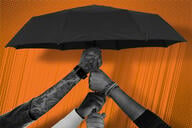You have /5 articles left.
Sign up for a free account or log in.
In an era of extreme creativity and growth in the high-tech industry, more and more college students are selecting science, technology, engineering or math (STEM) fields for their course of study. In 2016, nearly 30 percent of male and 15 percent of female college graduates earned their bachelor’s degree in a science or engineering field, while the proportion of humanities majors is dropping precipitously. In response to changing students’ preferences, colleges are under pressure to divert resources in terms of faculty members and courses toward STEM and away from the humanities.
Does this matter? With the rising costs of a college education, parents and students alike may find comfort in more “practical” majors, which may prepare students to attain one of the many emerging jobs in the high-tech or science-based industries. In this case, the shift in majors reflects a wise adaptation to the new economy.
But as the president of a liberal arts college, I worry that majoring in something “practical” has been conflated with holistic preparation for the trials of work and life, the ultimate purpose of a liberal arts education. The humanities -- the academic fields that study the human condition, society and culture -- prepare young adults for the most essential aspects of work: getting along with other people, understanding multiple points of view and coming to terms with one’s place in the world. As such, students of all majors need exposure to the humanities to be adequately -- and practically -- prepared for the working world.
Students who take a course in history, literature, and culture delve into a myriad of stories and events that reveal how people have worked and lived throughout history. Students who study in the humanities learn about hierarchy, power, deceit, injustice, love, compassion, sacrifice, rebellion and lust -- the range of human emotions and behaviors that have molded and continue to shape our realities. As Yale University professor John Hare says, “We read the classics to make us feel less lonely.” They help us realize that we are not the first to experience anything on this earth, but are part of a larger collective experience of being human.
I have seen that happen in my seminar as students study the life of Octavian Augustus. Most of the 19- or 20-year-old seminar students initially admire or even envy young Octavius, whom Julius Caesar chose to inherit Rome before he was 20 years old. But chapters later, students read that the same person connived to murder hundreds of people, including the great republican statesman Cicero, to solidify his power. Students struggle to come to terms with a character who is both admirable and despicable, who is perhaps as complex as we all are. By studying history and literature, students confront these human dilemmas, paradoxes and irrationalities that have engaged leaders and thinkers for generations, preparing them for the challenges they will confront in their professional, political, social and cultural lives.
Perhaps I have been too long a professor of public health, but I see the humanities as a type of preventive medicine, the study of which increases students’ subsequent resilience in the face of difficult life experiences. A college graduate who has studied the inappropriate use of power in history or literature, for instance, can better understand how abuse of power functions in contemporary society within the larger context of human affairs. As a result, graduates are better prepared to manage their responses, recognize the larger patterns of human behavior and effectively deal with such challenges in their own lives.
The same is true for their careers. CEO after CEO of tech companies echoes this mantra: learning to code is important, but understanding not just how to build things but also how to build things people want and need is crucial. Understanding those desires comes not just from mining data but also from intuitively gleaning human patterns from the data. The ability to create solutions that are elegant, graceful and easy to use develops not just from learning the technology; it requires a broader understanding of history, literature and, yes, art.
The late Steve Jobs put it this way: “A lot of people in our industry haven't had very diverse experiences. So they don't have enough dots to connect, and they end up with very linear solutions without a broad perspective on the problem. The broader one's understanding of the human experience, the better design we will have.”
The skills learned in the humanities are practical, and, even better they are timeless. At Vassar, we have a long history of multidisciplinary work that integrates STEM and humanities. Recognizing that computer coding, statistics and robotics are fundamental to advancement, the Vassar education also offers the careful, deep study of humanities and arts -- an education that provides enduring insights about our changing society, as well as the vital capability to shape our world for the better.




